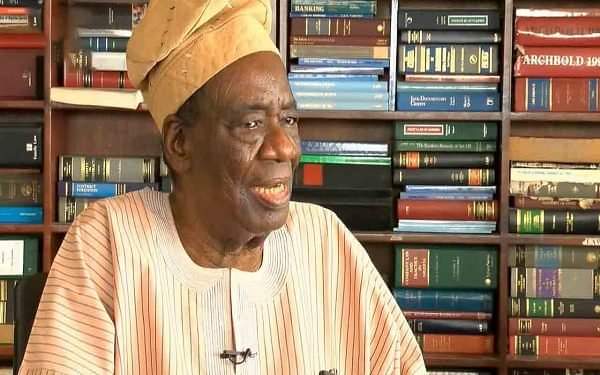
Former Attorney-General of the Federation and Minister of Justice, Chief Richard Akinjide, is dead.
Akinjide passed on at the age of 88 in his Ibadan residence, the Oyo State capital.
It was gathered that the legal icon, who died of complications from a protracted illness around 1 am, had been sick for three years.
Akinjide, an Ibadan high chief, was born in Ibadan, in the early 1930s to an influential family of warriors.
He attended Oduduwa College, Ile-Ife in Osun State and passed out with a distinction (Aggregate 6).
The Senior Advocate of Nigeria proceeded on his educational journey to the United Kingdom in 1951 and was called to the English Bar in 1955.
He was later called to the Nigerian Bar and established Akinjide and Co., a legal firm.
He was a Minister of Education in the first republic, under Alhaji Tafawa Balewa and Minister of Justice in the second republic, during the administration of former President Shehu Shagari.
Akinjide was a member of the judicial systems sub-committee of the Constitutional Drafting Committee of 1975-1977 and later joined the National Party of Nigeria in 1978, and became the legal adviser to the party.
While serving as the Attorney General of the Federation, Nigeria temporarily reversed the executions of armed robbers.
He was the lead prosecutor in the treason trial of Bukar Zanna Mandara; the eviction of many illegal foreign nationals from Nigeria which contributed to mild violence against some foreigners in the land.
His remains have reportedly been deposited in the morgue.
Legal icon, Akinjide dies at 88
By Emmanuel Oladesu
Elder statesman and frontline lawyer Chief Richard Osuolale Akinjide ((SAN) died this morning after a brief illness.
He was 88.
The eminent politician and father of former Minister of State for Federal Capital Territory (FCT), Oloye Jumoke, was hospitalised at the University College Hospital (UCH), Ibadan for old age-related ailment.
He was the counsel to former President Shehu Shagari in the historic presidential litigation, which he won against late Chief Obafemi Awolowo, based on the controversial 12 two-third permutation.
The Supreme Court ruled that the verdict that allotted victory to the defunct National Party of Nigeria (NPN) against the Unity Party of Nigeria(UPN) should not be cited as a judicial precedent.
During the governorship election, he was defeated by Chief Bola Ige.
Between 1979 and 1983, Akinjide served in the Shagari administration as Attorney-General and Minister of Justice.
He was succeeded by the lage Chief Kehinde Sofola.
The frontline politician worked closely with national party chairman, Chief Adisa Akinloye, Chief Busari Adelakun, Alhaji Lamidi Adedibu, Chief Sunday Afolabi and other NPC top notchers to instal Dr. Victory Olunloyo as governor in 1983.
Akinjide joined the defunct National Council of Nigerian Citizens (NCNC)in the fifties.
He was a prominent member of the Western Regional Caucus along with his former teacher at Oduduwa College, Ile Ife, Chief Babatunji Olowofoyeku (SAN), Chief Theophilus Benson (SAN), Chief Adeniran Ogunsanya (SAN), Chief Odeleye Fadahunsi, Chief Olu Akinfosile and Alhaji Adegoke Adelabu.
He succeeded Jaja Wachukwu in 1964 as Federal Minister of Education.
He had defected from the NCNC to Premier Ladoke Akintola’s Nigeria National Democratic Party (NNDP), which he served as regional secretary.
As Education Minister, his decision to appoint Prof. Saburi Biobaku as Vice Chancellor of University of Lagos to succeed Prof. Eni Njoku sparked an ethnic row.
Wachukwu, an Igbo, appointed Njoku, an Igbo. Akinjide, a Yoruba, appointed historian Biobaku, an Egba.
During the protracted crisis, Prime Minister Abubakar Tafawa Balewa, who was visitor to the university, kept mute.
In 1967, Akinjide declined the offer of Commissioner in the Western State under the military rule because the announcement was made on the radio before he was informed by the Military Governor.
In 1970, Akinjide defeated Chief TOS Benson during the Nigeria Bar Association (NBA) national chairmanship contest.
Between 1977 and 1978, he was a member of the Constitutional Drafting Committee (CDC) set up by the Murtala/O Obasanjo regime to fashion out the 1979 presidential constitution.
He was involved in judicial reforms. Until his demise, he was perceived as one of the elders of the Peoples Democratic Party (PDP) in Oyo State.
He was a member of the Body of Benchers.
By Wale Oyewale













